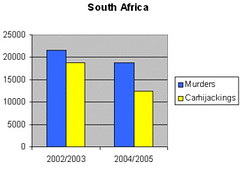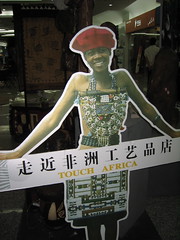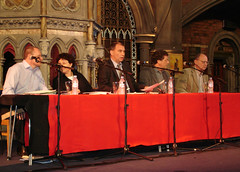BBC 1Xtra has done a documentary of the short but spectacular rise of Kwaito.
Listen to it here. To go to the web page go here.
Monday, June 19, 2006
A Kwaito history
Posted by
Wessel
at
1:33 pm
1 comments
![]()
Baked beans en cocaine
Just found this rather nice Boerepunk (Boerpunk) music video on YouTube.
They are Rokkeloos (meaning dressless - and a clever-ish Afrikaans pun on reckless). In this video Rokkeloos definitely do wear trousers and skirts (and bikini tops). Apparently they are a bunch of (rather angry) gals from Tswane. Me thinks they are a bunch of control freaks because they don't allow embedding of their video on Mhambi! Agenee! Give it up sistas.
Rokkeloos seem to be on the same nihilist wavelength of that other Afrikaans band du jour, Fokofpolisiekar, and Mhambi thinks they might just be better. In this song they sing that "dreams smell like baked beans and cocaine".
This is what the Mail and Guardian has to say about them.
Over-opinionated, still working in restaurants, living on rice and baked beans, going through a permanent “sexual phase” and partying hard, these four also come across quite raunchy. They mention their celebrity groupies: Paul Riekert (who produced their CD) and Chris Chameleon (who shags the lead singer). They call themselves female chauvinists and don’t tolerate victimised women or men who treat them nice to get something out of them. They have a serious attitude, even though their lead singer is called Prinses Petro.
Rokkeloos’s album is called Nooiens-vaart. The songs certainly have the most original sound of the three bands. Johannes Kerkorrel-like riffs result in a previously unheard genre -- kwela punk. Since they sing in Afrikaans they probably won’t make it on to the airwaves. You have to like them for their humour -- they mention “klippies en cocaine” and sing: “Ek hou van melktert ... brandewyn ... skaapbraai ... en hard naai [I like milktart ... brandy ... sheep braai ... and fucking hard].”
Read an interview with them in Afrikaans by the inimitable Watkykjy.
Posted by
Wessel
at
12:58 pm
0
comments
![]()
Saturday, June 17, 2006
Argentina makes BBC's virtual reality Messi
It seems the incredible second Argentine goal that featured 21 passes is a bit too much for the BBC's virtual replay application.
On loading the goal - click on Goal by Estaban Cambiasso - the Shockwave app starts to load the textures and animations, but then it gives an error, not enough memmory for sprites.
Argentina patiently strung together 21 passes before Juan Roman Riquelme fed Saviola who slipped a pass inside for Cambiasso. Cambiasso knocked the ball into Crespo who backheeled a return pass into the Inter midfielder who thumped the ball home from 12 yards.
Posted by
Wessel
at
5:27 am
0
comments
![]()
Tuesday, June 13, 2006
Kak duidelik says it loud and clear
When somebody says it better, in fact when they say it kak duidelik, then its better to defer to their superior eloquence. I have to defer to the kak duidelik blog on the matter of football:
The World Cup started with a moerse BANG on friday!! Germany with a win over Costa Rica, 4-2. A befokte goal from Torsten Frings!!!! Maybe, kykie possibly, the goal of the World Cup 2006.
Kykie, it was a mal goal, but I hope there are going to be better ones… after the first match, its been a let down so far. England’s match was NWATTA!! Straight up!!
England’s match was NWATTA!! Straight up!!
That ref was blowing for absolute kak… kykie, I dunno if it was because Crouch was too tall or what. Then someone told me that referees are old ex soccer players, that couldn’t make it to the big stage. So I’m thinking, this bra was naar, cos someone wysed him he couldn’t play… COS HE’S TOO SHORT!!! Now he took it out on Crouch, cos that bra is kaaaaaaaaaaaaak tall. I can’t put a picture of Crouch on my site, it’ll take too lonnggggg to download ek se…
Anyways, today Australia is playing against Japan. I recon Japan should win (maybe its cos I don’t gran the ossies). USA up against the Czech. And then… Italy VS Ghana… not sure who will win there… ofcourse Italy is going to win!
Anyways, ek hoep Eskom don’t catch on kak today, I know there’s an article saying that they won’t cut us off, but its Eskom we talking about.
Read more of this kak here.
Posted by
Wessel
at
3:07 pm
1 comments
![]()
Thursday, June 08, 2006
South African violence: Is it out of control?
South Africans, white and Asian ones in particular - and I have to include myself - do seem to be hysterical about the massive levels of violent crime in the country. But an article online has given me hope.
In the past I have staunchly defended South Africa's crime situation. Stating as an example that my whole family is there and touch wood, nothing has happened to them.
But recently I have come to see the problem as so large and intractable as to threaten the young democracy itself. And the despair is increased by the perception that crime is getting even worse.
Anecdotally it does seem to be the case of late. Apart from all the well publicised murders in recent months, in one month during my last visit my uncle was robbed at gunpoint, my sisters husbands father was severely assaulted (he was commotose for a few days) on his agricultural small holding, a fugitive policeman's car went up in flames in front of me on the highway from Jhb to Bloemfontein and a friend's brother was shot dead in an liquor store in Cape Town. It has been increasingly hard to convince myself that I was just unlucky.
But a very illuminating article in the Mail and Guardian and the comments of Anthony Altbeker, crime expert, researcher linked to the Institute for Security Studies (ISS) in Pretoria and author of The Dirty Work of Democracy: A Year on the Streets with the SAPS, has forced me to put on hold these creaping doubts.
Altbeker says that although most South African crime statistics is unreliable, two, murder and car hijackings, are reliable.
"Police cannot refuse to record a murder for obvious reasons. And then there is also a body to account for." The other concerns car theft and carjacking. "These tend to be well reported for insurance purposes."
This one has to say, makes sense. And here is the good news:
"Both murder and carjacking rates have declined over the past years. Last year's count of carjackings was 12 434, according to the SAPS; in 2002/03 it was 14 691. Murders totaled 18 793 in 2004/05, with 21 553 two years prior to that. The number of reported incidences of murder and attempted murder is considerably lower than just after the birth of democracy in South Africa in 1994."
But the crime has been redistributed. Whitey South Africans undoubtedly now experience more of it. But he says: "If you ask me whether white people are more often the target of crime than 10 years ago, I'd say absolutely... But if you ask me if they are more targeted than five years ago, I'm not so certain. There has been a redistribution of violence after the end of apartheid. But it is not just whiteys that express more fear, it is everybody."
Even now "Murder rates of white people are two-thirds lower than the national average."
The crime levels black South Africans exprerience is astounding, and to read an account of it go here.
Altbeker goes on to say why he thinks crime is falling, one of the reasons being that the generation that grew up during the 80's and early 90's (Township) War is getting older.
"September 1990 went down in the books as the most violent month in South African history. Now, 15 years after that worst apartheid violence, we live in a more stable society where people have learned habits of self-control."
Mmm... and now I feel a bit ashamed for doubting in the South African dream. I was an investigator of the Truth and Recociliation Commission. I investigated a massacre that took place on 4 September 1990. 42 township residents were slaughtered during the night. Most of them by a marauding Zulu militia. Later it turned out their weapons were supplied by the security branch of the police, and the investigation into the killings intentionally botched by the police.
If indeed the gereration of the Township War is partly to blame for South Africa's violence, it is incumbant for us to sit this out and hold our critical fire. We are partly responsible.
Just hope your not one of the unlucky ones. Sphere: Related Content
Posted by
Wessel
at
7:16 am
0
comments
![]()
Sunday, June 04, 2006
China defends its Africa policy
A top Chinese diplomat has vigorously defended his country's growing economic involvement in Africa, including close trade links with Zimbabwe and Sudan.
The charge d'affaires at China's South Africa embassy, Zhou Yuxiao, said China was just protecting its own interests.
Its policy of non-interference in the affairs of others has nothing to do with its need to import oil, he added.
Read a BBC report on this here. Sphere: Related Content
Posted by
Wessel
at
5:10 am
0
comments
![]()
Saturday, June 03, 2006
I signed the Euston manifesto
I signed this manifesto that calls for the renewal of the left. And it is with this text that I signed it.
I would have liked for a shift in emphasis here or there. The scant reference to the massive environmental challenge we face and the possibility of this truly global issue to help us mobilise and transcend national interest, being my main gripe. But essentially this is a wonderful document. It practically resonates globally and locally. As a South African its a rallying cry for the left in South Africa and Africa to follow the lead of Cosatu and meaningfully oppose the oppressive Mugabe regime in Zimbabwe and other even more oppressive African regimes. Also to stand up for women's, immigrants and gay rights in the face of an deadly assault from ultra conservative governments, vigilantes and religions (both Christian and Muslim) in Africa. As usual the best remedy is development. In a global economy is it not time we stop calling government contributions to the third world 'Aid' instead of progressive global taxation? And the sooner as that other trendy left debate, blaming it all on corporations, shifts to its focus onto the real issue, the selfishness of the all powerful developed country consumers/ citizens, the better.
Read the Euston Manifesto here.
Euston Manifesto Sphere: Related Content
Posted by
Wessel
at
8:17 pm
0
comments
![]()
Friday, June 02, 2006
South Africa still very unequeal despite recent good growth
Neva Makgetla, a Congress of South African Trade Unions economist, on the latest poverty figures in SA.
In 2004 — the latest data available — 70% of all households lived on less than $2 per person per day. Half of all households spent under R800 a month, or just over half the poverty line. Still, 2004 showed a very modest improvement compared with 2002. In 2002, 75% of households lived on less than the poverty line, and 60% of households spent less than R800 a month.
The available data suggest that the current growth spurt has done virtually nothing to support greater equality in earned income. In 2005, again using Labour Force Survey data, the poorest 50% of employed people got about 12% of income. In contrast, the richest 5% enjoyed 42%. These figures remained virtually unchanged from 2002.
The data do not permit reliable estimates of income distribution between households. Obviously, given high unemployment, the figures would be more inequitable than for earned income. Still, a slight drop in unemployment and the extension of social grants may have helped.
Unemployment fell very slightly between 2002 and last year — from 42% to 38%, using the broad definition that includes everyone who wants paid work but does not have a job.
Social grants probably played a stronger role in alleviating poverty. In 2002, about 25% of households living under the poverty line subsisted mainly on social grants, with 15% surviving on remittances from relatives and the rest from earned income.
In contrast, in 2004, 30% of those living under the poverty line said social grants were their main source of income, with more or less the same share living on remittances. The percentage reporting that most of their income came from earnings had declined, underscoring the inadequacies of job creation despite growth.
While overall inequalities have remained little changed, there has been a substantial expansion in the share of black people in the high-income group. In 1996, only about one in seven of the richest 10% of income earners was African. In 2005, the African share had almost doubled to just under a third.
Most of the increase in the African share in the high-income group resulted from the promotion of Africans in the public sector, which also increased its share in the high-income group overall. The share of Africans in the public sector in the top 10% of income earners rose from a third to half, while the share of the public sector as a whole in the best-paid 10% rose from 29% to 33%.
Read it all here.
Posted by
Wessel
at
3:32 pm
0
comments
![]()







